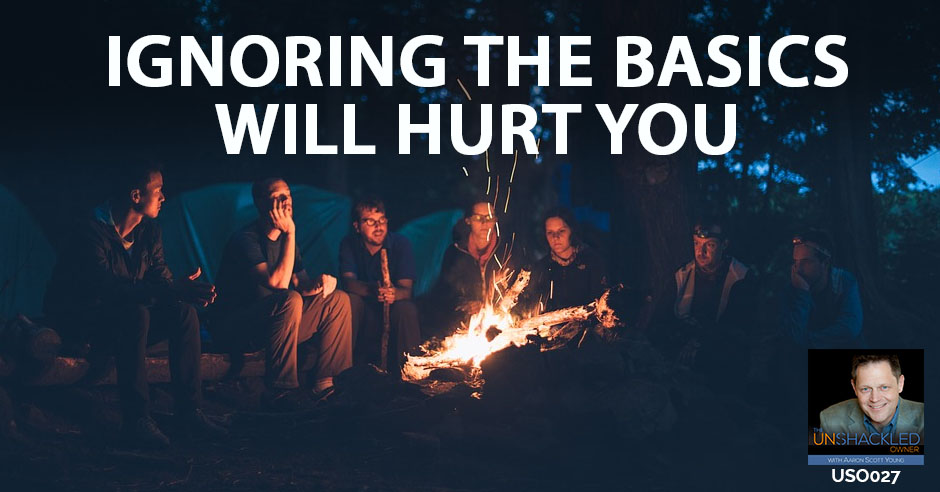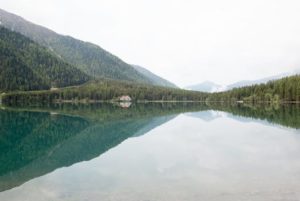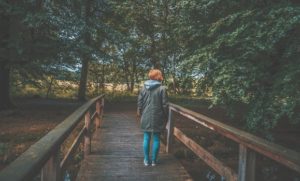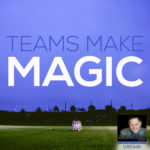
Ignoring The Basics Will Hurt You: I love being here with you guys. Today, I don’t have a guest. We’re not doing an interview, but rather I just wanted to tell you a quick story from an experience I had very recently. It’s a story that reminded me of how critical it is to pay attention to the basics.
Listen To The Episode Here
Ignoring The Basics Will Hurt You
As a young man, I was in the Boy Scouts of America. The Boy Scouts’ motto is, “Be prepared.” If you talk to my wife or my kids or my friends, they’ll always tell you, “Aaron is always overthinking everything. He’s always prepared. He’s always got doubles of things. The guy’s on it.”
I had an opportunity to go actually work with the Boy Scouts recently. They have a big horse program up here in the northwest. They’ve been running a little bit of a shortfall. They’ve asked me to get involved and help them come up with interesting ways to increase the revenues for the horse program so that they don’t have to cut back or cut horses or whatever. The guy that runs the program, Scott DePaolo, he’s been up there now for 28, 29 years running Butte Creek Scout Ranch. He’s a successful horseman in his own right, he’s got his own horse facility separate from the work he does with the Boy Scouts. He’s invited to speak all over the place, a great guy. The Boy Scouts just couldn’t have a better mentor for these young people to look up to than my friend Scott.
Scott called up and he said, “Aaron, we’re going to be doing our, what’s called the West Bound Horse Trek,” where they bring the horses from Butte Creek Scout Ranch way over on the eastern side of Mt. Hood near Dufur, Oregon, up around Mt. Hood about almost 190 miles to Scotts Mills where the Butte Creek Scout Ranch is. From Camp Baldwin Summer Camp, 190 miles to Butte Creek Scout Ranch. When Scott invited me to come in the horse trek, I was very excited. I had gone as an eighth grader on the very first ever horse trek way back in 1977. Then that had gone on for several years and then they closed the program down, they started trucking the horses between Butte Creek and Camp Baldwin. Then, my friend Scott took over back in 1988. He was going to reopen the whole program and get kids coming back out to the ranch. He wanted to revive the horse trek. Way back then, as two young married guys, he invited me to come be one of his wranglers and work with him and take all these youth on this big long ride that takes about eight days.

Ignoring The Basics : Be prepared.
Fast forward 28 years, I was being invited to come again. I was very excited about it. Man, I started working on my bedroll and getting just exactly the right kind of bedroll. I wanted to make sure my sleeping bag is right in my boots or right in my spurs and the things that I was packing would be good for hot days and cold nights and that I had all my ten essentials in my saddle bag so that I’d be prepared if for some reason I got lost or separated from the group and I had to stay out by myself for overnight. I had my fire starting kit, I got everything ready. I packed up my duffle bag and my saddle and my bedroll sleeping bag, it’s much more than a sleeping bag. The bedroll is like a luxury bed for cowboys.
Anyway, I got all my stuff ready, threw them in the back of my truck, hooked up my horse trailer, put my big old Tennessee walking horse gilding rocker into the back of the old horse trailer and I cruise on up to meet the Boy Scouts. I was going to be meeting them midway on the ride. I was going to meet them on Wednesday when all the parents come up to meet their kids. They have a big camp fire and so on. Then I was going to continue on Thursday, Friday, Saturday and Sunday morning with them as we rode the last about 100 miles. I was very excited about this.
We had a great time on Wednesday, we had a great camp fire, we talked with the parents. I was talking with a lot of the kids and learning what they loved about the program so that I could do more to help the council to raise money. I had a couple of guys, my son Max and also Jonathan Hazzard were with me up there. We were shooting video and making some really cool stuff. The point, I had this film crew shooting, we were getting interviews with the key players, with some of the kids. It was so great. We got up Thursday morning, we filmed, people getting ready with their horses and saddling up. There’s a great film of me pulling my horse out and putting the saddle on. Anyway, that morning, we got up, we got ready to go and headed out. We rode on a beautiful, beautiful ride down the Pacific Crest Trail for a while and then around Timothy Lake in the shadow of Mt. Hood and then down onto some old forest service roads. Anyway, it was a 21 mile ride, but we had a lot of kids with us and we were stopping and starting a lot.
One of the things that I asked Scott, my friend who was running the entire event, I said, “Will there be water when we stop for lunch in the middle of the afternoon?” He said, “No, there won’t be.” He said, “Whatever you can carry.” He said, “Usually, a bottle of water is good. If you need two, get two.” I knew that I need a lot of water because years ago, I had some major surgery and because of the results of those surgery, I dehydrate very quickly. I knew I better have a lot of water. I had two sixteen ounce bottles and another 20 ounce bottle and I had them filled up, but I knew it was going to be a long day. I knew I we’d be in the saddle for seven, eight, nine hours and I knew it was supposed to be very hot that day. I thought, “I’m going to go easy on my food so I’m not spending a lot of energy on digesting food. I’m going to be really mindful of my water because this is all I’ve got.” I ration the water throughout the day.
We rode along, we did this 21 mile ride, we spent total of nine hours on the trail, about eight hours in the saddle, which is a long day in the saddle by the way. If you’ve not ridden horses much, that’s a long day. It was warm and it was dusty. It got to the point where I was drinking water, but I was just wetting my mouth and so on. We get to the end of the ride. I’ve only consumed about two-thirds of the water I brought. Just to give you some context, these two sixteen ounce bottles and a 20 ounce bottle of water, I would’ve consumed that on a normal day by maybe 9:00 in the morning. But here it was now after seven in the evening, after a very long day and a hot day outside in the weather, under the sun on the trail.
We got up and we’d all circled up into a great big circle. Me, the other staff and about 35, 40 kids. There’s all total maybe 50 riders and closer to 60 horses with the pack horses and others that were being ponied. We’re all in a great big circle. As I got up there, we’re in camp now, we’re at the end of the day, all of a sudden, I could feel it coming over me. I could feel that lightheadedness. I thought, “I know this feeling, I’m dehydrated.” I looked over at the medic who was a few horses away from me and I said, “I’m getting lightheaded.” I climbed down off the horse, kind of embarrassed because everybody else was in the saddle, our leader was talking to us. While everybody else was supposed to be sitting in the saddle listening, I jumped down off my horse in front of all those people and God to see. I was getting very, very dizzy so I leaned my head against the saddle leathers and leaned against my saddle and I could feel myself starting to fade. I thought, “I better sit down.”

Ignoring The Basics: I passed out, I blacked out.
Somewhere in that moment between leaning against my saddle and having the thought, “I should sit down,” I passed out, I blacked out. The next thing I know, there are three medics all over looking down at me. I’m laying on the ground, I’m looking up at them and they’re like, “Are you okay? Do you know where you are? Do you know who you are?” I said, “Guys, I’m so tired, just let me sleep for a minute.” They said, “No, you need to stay awake.” All of a sudden, I started to get clarity. I thought, “Wait a minute, I was just on my horse. Now, I was on the ground.” I said, “What happened?” They said, “You got down off the saddle, you stood by your horse for a minute and then you very gently slumped down to the ground. We thought you were picking something up, but then you didn’t get back up.”
They came over, they circled me. They said I was only out for maybe fifteen seconds. This was at 7:15 in the evening. It took me about 35 minutes to get clear enough in my head to sit up and to walk with assistance down off the hill where my horse had been, down and then sit in a chair and start to get some liquid into me. I sat in that chair from 7:15 until finally the paramedics arrived, which is the Boy Scout protocol. As I drank water and got liquid in me, I started feeling much better. I had a little bit of candy and some quick sugar hit and that perked me right back up. But they didn’t know what was wrong with me. I knew I was dehydrated, but I’d ignored everything I knew about my medical situation, my body, my need for liquid, how much I should be eating, how much I should be drinking, everything.
No matter how much I’d prepared my sleeping system, my bedroll, no matter all the right things I’d packed, no matter all the good clothes, no matter having a lot of water in my saddle, I hadn’t drank it all because I was trying so hard to conserve, because I hadn’t eaten very much, my body got fatigued. All of a sudden, I’m down. We’re in the freaking middle of nowhere. When they couldn’t reach the paramedics on the satellite radios, they had to resort to something called Spot, which they push a button that sends a signal to a satellite and it goes through the sheriff in that county and they dispatch medical help. From the time they hit Spot, it still took over 90 minutes under an emergency situation for the paramedics and the sheriff to arrive on scene way up there in the middle of freaking nowhere in the back country.
I was okay, I was dehydrated. It was embarrassing, but it was also very scary. As I sat in the chair and it got colder and colder, it dropped way down, got very cold that night and I’m wrapped in a blanket. At first, I was shivering because I was super dehydrated. I finally got warm. All I could think in my mind was, “Aaron, you knew better than this. You did this to yourself. You ignored what you should’ve done,” out of vanity, out of concern for maybe having to stop and go to the bathroom on the trail or maybe being scared and thinking, “What if I ran out? What if I don’t have enough?” A scarcity mentality will always work against you.
I didn’t finish the ride. I’d been excited for six weeks to go on this horseback riding. I spent three and a half days up in the beautiful cascade mountains, riding my horse, being with these guys, sleeping out under the stars. I was so excited about it and I got one day, one day on my horse. The first night, when I first arrived under the stars, sleeping in my brand new bedroll and then had a good day riding, I did my blackout, I had to get clearheaded again and then while the ambulance didn’t feel there was any need to take me into a hospital or anything, they thought I was fine, I did make the choice and the scouts encouraged it, that because this had happened, maybe I shouldn’t finish the ride this time. The deputy sheriff put me in his car and we drove for, I don’t know, two hours down off that mountain, down into the back little small towns and into the bigger city and out to Troutdale, Oregon where my wife was able to pick me up at 1:00 in the morning.
Guys, it’s such a cautionary tale. I tell you this embarrassing story about me passing out up in the mountains, passing out because I failed to do the things I knew I should’ve done, ignoring my body chemistry, completely ignoring my medical history. I’m a guy who’s had a bypass surgery, I’m a guy who has no large intestine and I dehydrate quickly. I ignored it. How many times do we, in our business, we know there’s stuff we should be doing but we’re worried about money, we’re worried about time, we’re worried about time away from family, we’re worried about bringing on that new employee, we’re worried about maybe I don’t know enough about this technology so I better just ignore it and keep doing it the old way?
We ignore the basics and we can get away with it for a while. But what happens if you let enough little things add up, like I didn’t sleep enough, I didn’t eat enough, I didn’t have enough sugar, I didn’t have nearly enough water and I pushed myself in ways that I was unused to pushing myself. You do enough little things in your life, in your marriage, in your responsibility with your relationships, especially in your business. You let enough of those little things add up and all of a sudden, out of the blue, it sneaks up on you and you have the problem.
Usually, it’s like a tipping point. You’re tolerating, tolerating, tolerating and then boom, you’re in an emergency situation and you’re at risk and you could lose everything. I was way up in those mountains. If I’d had a real medical problem, I could’ve died in those mountains because I was so far from any help. If by simply doing what I needed to be doing, by just doing the stuff that I knew I should do, I would’ve been fine. But no, I thought I’m going to ignore it, I’m going to rationalize this behavior, I’m going to let my vanity get ahead of me and it ended up sneaking up and biting me. I was okay, but I missed out on a great experience. I had to be in a position to scare a whole bunch of kids who thought, “One of our leaders just hit the ground.” This great back country wilderness experience, I had to bring the sheriff and the paramedics up into it and the lights flashing and totally changed the nature of the situation for these people, both the kids and the adults. Embarrassing, frustrating, missing out on experience because I ignored the basics. Don’t allow yourself to ignore the basics.

Ignoring The Basics: Part of being unshackled is by taking care of those little basic things so they don’t add up
Benjamin Franklin said, “By failing to prepare, you are preparing to fail.” Don’t let yourself be one of those people. Listen to the Boy Scout motto and be prepared. Part of preparation is not only having the right gear, not only having the right equipment, not only having the right safety stuff in your saddle bags, but it’s doing the little things hour by hour, day by day, month by month so that you keep yourself healthy, strong, focused and able to do the work that’s in front of you, able and prepared to take the opportunities that come your way and not have to miss out on them because you’d failed to do the basic stuff that you know in your heart already that you need to be doing.
Part of being unshackled is by taking care of those little basic things so they don’t add up, they don’t sneak up on you and they don’t put you at risk in a situation where you really could lose everything. That’s the message tonight on The Unshackled Owner. I’m telling you an embarrassing story. Sometimes the hardest stories to tell are the ones that help people the most. I’m sharing an embarrassing thing, something I wish you didn’t have to know about, but I’m doing it because I want you to learn the lesson that I was reminded of. Don’t ignore the basics because when you do, it will hurt you. That’s our lesson today. You guys go out and make it a great week.
- AaronScottYoung.com
- The Unshackled Owner Twitter
- The Unshackled Owner Facebook
- Aaron Scott Young LinkedIn



